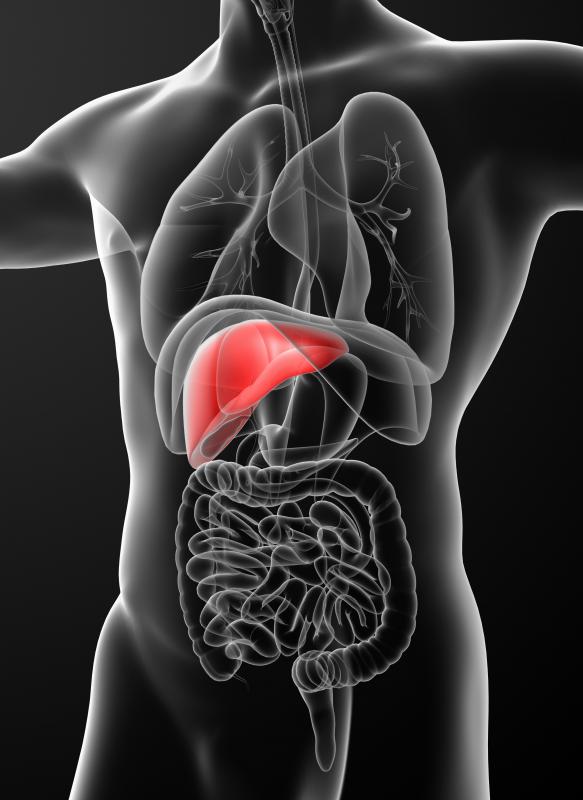At WiseGEEK, we're committed to delivering accurate, trustworthy information. Our expert-authored content is rigorously fact-checked and sourced from credible authorities. Discover how we uphold the highest standards in providing you with reliable knowledge.
What is Organomegaly?
Organomegaly involves the enlargement of body organs. Many different factors may cause such enlargement. While some causes are benign, others are more serious. Heart enlargement, liver enlargement, and spleen enlargement — called cardiomegaly, hepatomegaly, and splenomegaly, respectively — represent three examples of abnormal organ enlargement. Autoimmune disorders often cause organomegaly as well.
Organomegaly most often manifests as a symptom of a disorder, rather than being the disorder itself. Hepatomegaly, for example, can result from several diverse medical problems, ranging from infection to tumors. Congestive heart failure frequently facilitates cardiomegaly. Organ enlargement usually coincides with other symptoms relating to a particular disorder. With various liver dysfunctions, jaundice, or yellowing skin, frequently occurs alongside the organomegaly.

Enlargement of large organs is commonly detectable by the presence of a mass. In hepatomegaly, an abdominal mass may form. Cardiomegaly may cause swelling in the chest area, specifically if the heart is at least 50 percent larger than the inside of the ribcage. Ultrasounds, blood tests, and physical examinations can also help locate organomegaly and offer some insights into possible causes.

One of the more common forms of organomegaly is an enlarged spleen. This organ is located in the upper abdomen, and its enlargement typically results from stress on the body due to hypertension. Any stressful body influences like high blood pressure or cancer can enlarge the spleen to dangerous levels. Pain in the chest, abdomen, and back are the most common effects. Splenomegaly usually necessitates surgical removal of the spleen.

Both splenomegaly and hepatomegaly are found in autoimmune diseases. While these disorders are rare, organomegaly is a main feature. When the body’s immune system attacks endocrine organs like the body’s various glands, conditions such as autoimmune polyendocrine syndrome and POEMS (an acronym derived from the syndrome's main disorders: polyneurothapy, organomegaly, endocrinopathy, monoclonal gammopathy, and skin changes) syndrome result. Susceptibility to frequent infections is a consequence of the conditions, as is limb numbness and weakness in the case of POEMS syndrome. Paraproteins located in the urine and blood contribute to the abnormalities.

Although exercise and other harmless factors may lead to body organ enlargement, chronic organomegaly should never be taken lightly. As indicated, many serious and possible life-threatening conditions may be responsible. In the case of POEMS syndrome, some research claims the survival rate is less than one half by five years after onset if the disorder is left untreated. Since organ enlargement usually has an underlying cause, discovery and treatment of the main disorder is crucial. A trained medical professional can best evaluate all options and outcomes.
AS FEATURED ON:
AS FEATURED ON:



















Discussion Comments
@DylanB – It's true that no organomegaly is reason to celebrate, but some are worse than others. One that happens very often is the enlargement of the appendix, and my surgeon told me that this is something she sees on an almost daily basis.
I had to have my appendix removed after I felt intense pain in my lower right abdomen. I came in to the emergency room, and after a CT scan showed that my appendix was enlarged and another test showed a high white blood cell count, they scheduled my appendectomy.
They told me not to worry. They said it was a common, simple procedure. I didn't have any complications from it, and they made me feel more confident going into surgery.
I suppose I have organomegaly of the kidneys, because mine are enlarged due to a disease that I have. With polycystic kidney disease, you get multiple cysts on your kidneys, and they get bigger over time.
My largest cyst is 10 centimeters, which is pretty big for an organ cyst. My kidneys are so big that they are not fully protected by my rib cage.
There's no way to shrink them back to normal size. I may eventually need a kidney transplant, but only if the cysts grow so much that they choke out my kidney function. So far, they are functioning just fine.
Any time that an organ gets bigger, it means that there is likely pressure and stress involved. Stress on a heart is a very bad thing.
Post your comments